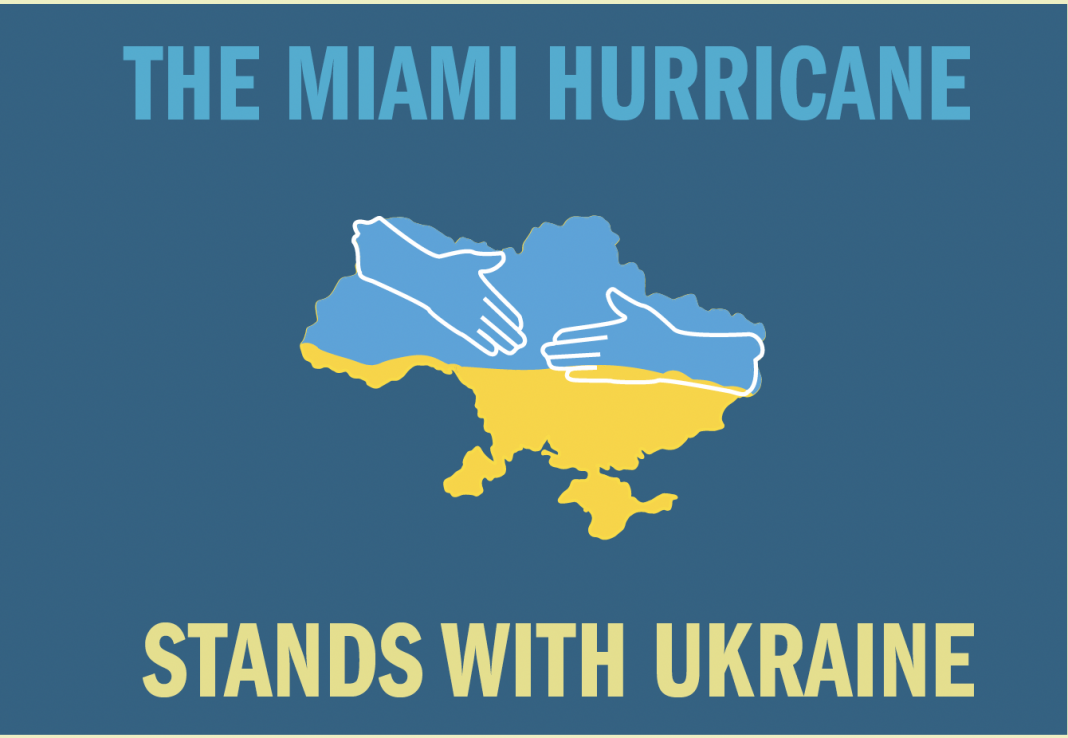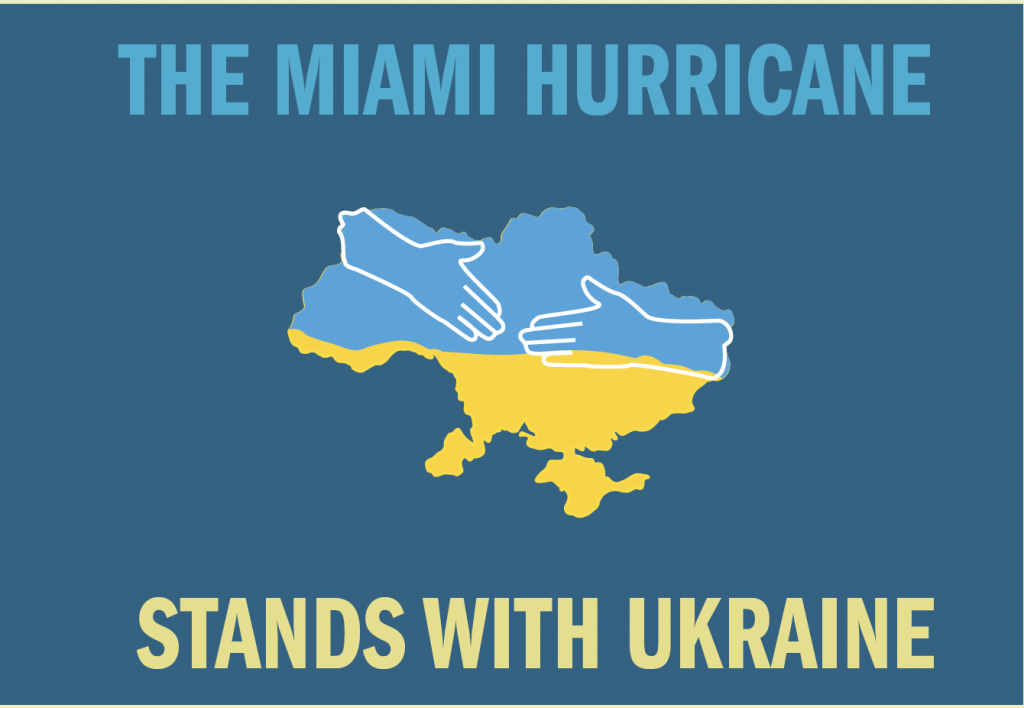

Ekaterina Smirnova was sitting in a lecture hall when her phone buzzed with a text message from her father. The text read, “the war has started.”
Before mainstream western media had even published the news, Smirnova, an international student from Russia, audibly gasped and turned to her peers to tell them Russian President Vladimir Putin had launched an invasion of Ukraine.
“I felt really anxious and scared, and I didn’t know what to do or how to feel about it,” said Smirnova, a senior studying broadcast journalism and creative advertising at the University of Miami.
In the early morning of Feb. 24, Russian troops launched a full-scale invasion of Ukraine. Russian air, land and sea forces pushed into the country; the most aggressive military act in the region since the annexation of Crimea in 2014.
In the weeks leading up to Russia’s invasion, the world watched anxiously as Russia built their military presence on the Belarus-Ukraine border to the east of the capital city, Kyiv. Russian forces were also building up in Crimea, south of Ukraine, and on the Russian-Ukrainian border to the east of Kyiv.
Tensions reached a boiling point on the morning of Feb. 24 when Putin launched what he had called “a special military operation” to enter Ukraine.
Russian tanks and troops crossed into Ukraine from the northern, eastern and southern borders, steamrolling towards Kyiv. The Russian navy landed in Odessa, a port city in southern Ukraine. Shortly after Russia launched a land invasion, Russia’s air forces targeted cities and military infrastructure across the country.
Russia’s full-scale invasion has displaced hundreds of thousands of Ukraineans and left hundreds dead.
Despite the tensions that built leading up to Feb. 24, experts and the international community did not anticipate an invasion of this magnitude.
“It came as a complete shock to many of the people who work in the field,” said Dina “It came as a complete shock to many of the people who work in the field,” said Dina Moulikova, a professor of international studies at UM with an expertise in Russian affairs. “There was disbelief that it actually would come to fruition.”, a professor of international studies at UM with an expertise in Russian affairs. “There was disbelief that it actually would come to fruition.”
Since Putin’s invasion, there has been an outpouring of support for Ukraine from international actors, public figures and even Russian civilians. Protesters around the world have taken to the streets in solidarity with Ukraine from Moscow to Berlin.
In an email to the UM community on March 2, President Julio Frenk made clear his condemnation of Putin’s actions and his support of Ukrainians in Eastern Europe and here on campus.
“The Russian government does not speak for all the inhabitants of the country,” Frenk said. “We have many Russian community members who share our concern for those impacted and our fervent desire for peace.”
Smirnova, who’s family still resides in Russia, said that her family is among the majority of Russians who disapprove of Putin’s actions. Smirnova said that she hopes her peers recognize that the Kremlin’s actions are not those of the Russian people.
“They don’t support him or his policy,” Smirnova said. “They did not choose this government, they did not choose this leader, they do not support his views.”
How western media and state-owned media in Russia are covering the issue tells two drastically different stories.
Moulioukova said that Putin has justified his actions with claims that the invasion was launched to protect the interests of ethnic Russians in Ukraine, unify the identity between Russians and Ukrainians, keep Ukraine from developing nuclear weapons and defeat Ukrainian elites who serve as puppets to the West, more specifically to the United States.
“What I am telling you is not my opinion,” Moulioukova said. “It is how Russia, the Kremlin in general and Putin specifically has framed their discourse and how they’ve justified what is happening right now.”
Regardless of how Putin justifies the Russian invasion of Ukraine, what he hopes to gain from his actions baffles Moulioukova.
“I’m not sure to be honest with you,” Moulioukova said. “Maybe to some extent demonstrate to the West that Russia’s interests matter, that Russia is ready to defend its interests… More on the domestic level, proving the legitimacy of Putin’s presidency and Putin’s leadership.”
Although Putin continues to push his narrative in Russia, many Russians and the international community have come out to condemn his invasion of Ukraine.
“In all honesty, I do not believe that there is a reason—any reason— that would somehow validate Putin’s decision as rational,” Olga Pilichowska, a freshman at UM from Poland. “Even the most valuable gain does not excuse the suffering of innocent people.”
On Feb. 19, Poland lifted all restrictions to Ukrainian refugees entering their country. As of March 3, at least 505,000 Ukrainian refugees have entered Poland seeking refuge.
“It’s true, Polish people are naturally quite cold, yet this situation has sparked a nation-wide act of unity and solidarity,” Pilichowska said.
At least another 449,000 Ukrainians have fled to Hungary, Moldova, Romania, Slovakia and other European nations. Ukrainian men ages 18 to 60 are prohibited from leaving the country in order to keep them available for military conscription.
Charleigh Peters, a junior at UM studying abroad in Prague this semester, said that the streets there are lined with Ukrainian flags and filled with demonstrations in support of Ukraine. On Feb. 27, tens of thousands of Czechs gathered in the streets of Prague to protest Russia’s invasion.
“There has been massive support for the people of Ukraine in Prague,” Peters said.
While neighboring countries open their borders to the refugees, the international community has condemned Putin’s invasion. On March 1, about 100 diplomats walked out during Russia’s foreign minister’s speech at the United Nations Human Rights Council in protest of Russia’s invasion.
Three days later, in his state of the union address, President Joe Biden condemned Putin’s actions and announced strict sanctions on Russian business.
As international actors pressure Russia to halt their attack on Ukraine, UM administration and students stand in solidarity with Ukraine.
“My heart aches for all the people of Ukraine who have been touched by this unnecessary, wanton act of cruelty and inhumanity,” Pilichowska said.





